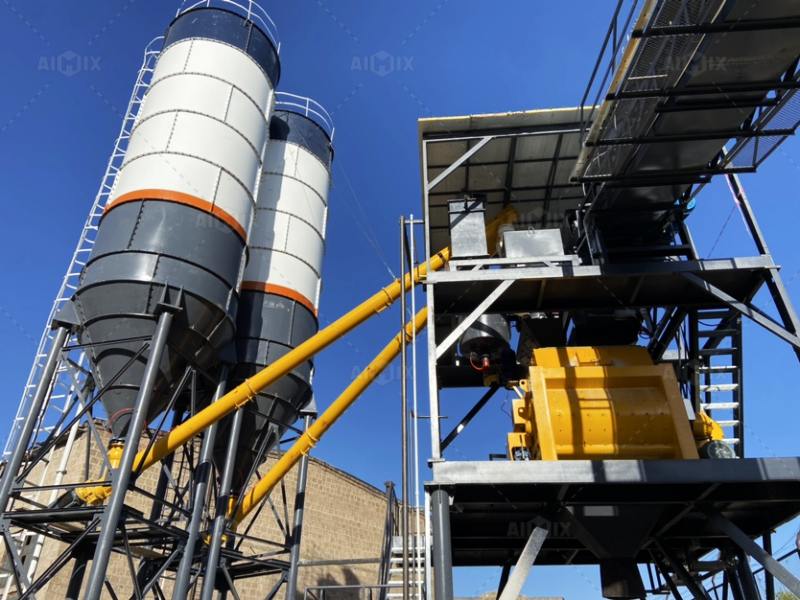The construction industry is increasingly relying on ready-mix concrete to improve project efficiency, quality, and sustainability. For contractors and investors, understanding RMC plant project cost is crucial for budgeting, planning, and maximizing profitability. With careful planning, businesses can optimize costs while ensuring high-quality concrete production. This is especially important when evaluating options among ready mix plants for sale, where the choice of plant type, capacity, and technology significantly affects the overall investment.

The type of RMC plant is one of the most significant factors affecting project cost. Stationary ready mix plants are ideal for large, long-term projects requiring high-capacity concrete production. They offer stable operations and consistent concrete quality but usually involve higher initial investment and infrastructure requirements.
Mobile or compact RMC plants are better suited for projects that require flexibility and frequent relocation. While the upfront cost may be lower, additional expenses such as transportation, setup, and maintenance should be considered. Choosing the right type of plant is critical for controlling RMC plant project cost while meeting operational needs.
Capacity, measured in cubic meters per hour, directly impacts the plant’s purchase price and operational cost. High-capacity plants allow for faster production and better labor utilization but come with higher equipment costs and energy consumption. Low-capacity plants may reduce initial investment but could lead to delays on larger projects, increasing labor and overhead costs.
For those exploring ready mix plants for sale, assessing project demand and estimating concrete volume accurately ensures that the selected plant meets current and future production needs without overspending.
Automation plays a vital role in controlling RMC plant project cost. Modern plants offer fully automated systems with PLC controls, real-time monitoring, and automated batching. These systems reduce human error, improve mix consistency, and enhance efficiency.
While fully automated plants may have higher upfront costs, the long-term savings in labor, material wastage, and maintenance often justify the investment. Contractors looking at ready mix plants for sale should evaluate the level of automation suitable for their project scale and budget.
The location of the RMC plant affects transportation, labor, and construction costs. Plants near construction sites reduce transport expenses and avoid delays caused by traffic or logistics issues. Adequate infrastructure, such as stable foundations, power supply, and water access, also influences installation costs.
When considering ready mix plants for sale, factoring in site location and available infrastructure helps optimize the overall RMC plant project cost. A plant that is easy to install and operate near the project site minimizes unnecessary expenses.
Technological features, such as high-efficiency mixers, dust collection systems, and real-time monitoring software, can impact RMC plant cost. While advanced features may increase initial investment, they improve productivity, reduce material waste, and ensure consistent concrete quality.
Additional options like hot water systems, chemical admixture dispensers, and fiber reinforcement integration allow the production of specialized concrete types, adding flexibility and value. Choosing the right combination of features from ready mix plants for sale can enhance operational efficiency and reduce long-term costs.

Before purchasing, analyze project size, expected concrete demand, and future growth. This assessment helps in selecting the appropriate plant type, capacity, and features, avoiding overspending on unnecessary capabilities.
When evaluating ready mix plants for sale, compare prices, technical specifications, and after-sales support. Reliable manufacturers may charge slightly more upfront but offer durable equipment, training, and maintenance services, which reduce operational costs in the long run.
Optimize concrete delivery routes, storage, and batching schedules to minimize transport and material handling costs. Proper planning reduces fuel consumption, labor hours, and delays, directly lowering RMC plant project cost.
Regular maintenance of mixers, conveyors, silos, and control systems prevents costly downtime. Maintenance plans should follow manufacturer guidelines and include daily, weekly, and monthly checks. Well-maintained plants operate efficiently, prolong lifespan, and reduce repair expenses.
Trained operators improve plant efficiency and concrete quality. Reducing human error through training and automation lowers waste and labor costs, helping control overall RMC plant project cost.
Efficient planning of an RMC plant offers multiple advantages:

Understanding and optimizing RMC plant project cost is critical for contractors, developers, and investors. By carefully evaluating plant type, capacity, automation, location, and technological features, businesses can select the best ready mix plants for sale to meet their project needs efficiently. Strategic planning, preventive maintenance, and workforce management further reduce operational expenses while ensuring high-quality concrete production.
Investing time and resources in proper planning not only minimizes costs but also enhances productivity, sustainability, and long-term profitability. A well-chosen and efficiently operated RMC plant is a cornerstone of successful ready-mix concrete projects.